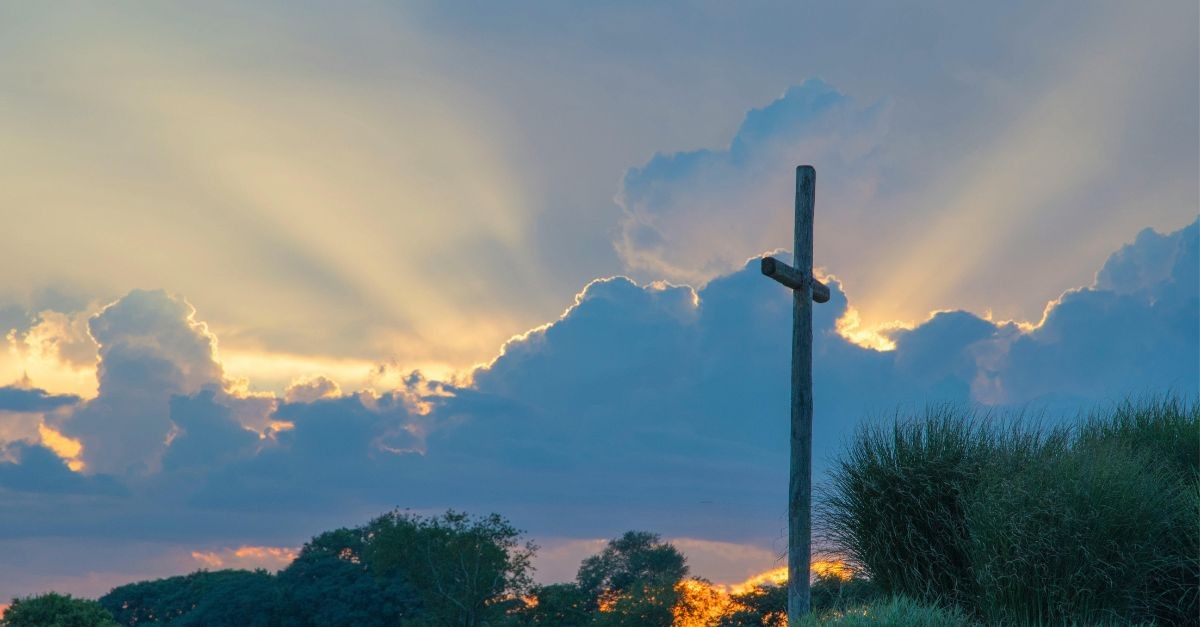
Romans 13:1-2 says, “Let every person be subject to the governing authorities. For there is no authority except from God, and those that exist have been instituted by God. Therefore, whoever resists the authorities resists what God has appointed, and those who resist will incur judgment.” Do you ever read a verse like that and think, “Yeah, but Paul didn’t understand the nincompoops we have in leadership”? That argument doesn’t fly very far when we realize it was the wicked and pretty much insane Nero who was in charge when Paul wrote those words.
In the Old Testament, the prophet Daniel lived in similarly difficult and unstable times. Daniel lived in a time when the Israelites were taken off into Babylonian captivity. The Babylonians were dedicated to chiseling away any distinction they had, which kept them from being fully Babylonian. They’d allow you to practice your own religion—so long as it ultimately bowed to the national one. Daniel’s time was somewhat similar to our own. His interaction with Babylon can teach us how to live under imperfect leadership in our day.
Photo Credit: ©Getty Images/Microgen

1. How Do We Live Well in a World That’s Not Our Permanent Home?
This is really not a lesson from Daniel but rather a lesson from Jeremiah. In Jeremiah 29:4-7, the prophet outlined how the people were supposed to live when they were in Babylon. They were being pulled out of the Promised Land and placed into a scary and unknown world. And this was happening because of God’s judgment. Did this mean that God had given upon them? Should they just blend into Babylon now? Should they fight? How should they respond to the exile?
1 Peter 2:11 tells us as believers that we are “sojourners and exiles.” Much like Daniel, the place where our feet reside is not in the locale of our ultimate citizenship. So, what do we do as exile? How do we now live? Should we just burn it all to the ground, rest in the fact that this world is not our home, and let it go? Or do we labor to get ourselves back home? Should we fight the exile? Should we fight the instability?
The answer, which Jeremiah provides and we see lived out in Daniel, is “yes and no.” We become part of Babylon, but Babylon cannot be a part of us. Jeremiah told Daniel and the other exiles to seek the welfare of Babylon. They should redeem this place where the wild things are. They are supposed to live there and love there.
They were to seek the welfare of Babylon because of the promise that God gave them in Jeremiah 29:11-14. God is ultimately leading them back home. We know from the story of the Bible that the only true way “back home” and out of exile—is through the Lord Jesus. And because of the certainty of this destination, we are freed up to seek the welfare of our “Babylon.” But what does that look like?
Photo Credit: ©iStock/Getty Images Plus/Yuri_Arcurs

2. How Do We Sever Dependency on a Fallen World?
There is no way for Daniel and his friends to live in Babylon without at least some element of compromise. There is no way for them to live and love in Babylon while being completely disengaged. And in order to have any meaningful engagement it will mean they have to fit in, at least in some way. It’s interesting to me as we read through Daniel 1:8-21 all of the places where they do compromise. Frankly, it’s unsettling.
You know that phrase “line in the sand”? It means placing a marker and saying something like, “I’ll go this far, but no further. I won’t cross that line”. It’s shocking to me that Daniel didn’t draw the line. Let me explain.
When you were brought into exile, you didn’t have much freedom. They wanted to take every bit of their Hebrew identity out of them and make them full-fledged Babylonians. Their plan for Daniel and his friends was to make them “wise men” of Babylon.
This would require learning Aramaic and Akkadian. No more Hebrew. They didn’t draw a line there. They would have been immersed in their literature and learned all of their history. We’re talking a different flood narrative, and credit given throughout to the false gods of Babylon. No line was drawn. Part of their education would have been in learning how to read the future through astrology and sheep livers. It was, essentially, divination. Daniel had to learn this. This is where I’d have drawn the line. Daniel didn’t. They didn’t even budge when their names were changed.
But when it came to eating food from the king’s table, Daniel drew his line. Why? Why draw it here? There are several theories. Some think it had to do with the food not being kosher. That’s possible, but why did he indulge in chapter 10? It likely wasn’t a protest because nobody knew about this except one person. It might have been because the foods were offered to the Babylonian gods, but that doesn’t explain why they could eat vegetables—those would have been offered, too. What is happening here can be found in Proverbs 23:1-3.
The reason why Daniel and his friends refused the king's food is because it was deceptive food. Eating the king’s food was to create a relationship of dependency with the king. It’s because this was the one place where they could draw a line in the sand and say, “No, we will depend upon YHWH.” It’s where they could sever that tie and remind themselves and others and eventually show others…that GOD was the one to depend upon.
Likewise, we would do well to think about our places of dependency upon this fallen kingdom and work to sever that dependency.
Photo Credit: ©GettyImages/TriggerPhoto

3. Stand Firm on Core Convictions in a Compromising World.
There were quite a few compromises that Daniel and his friends made in order to seek the flourishing of Babylon. Some of these might be shocking to us. But really it ought to inspire us to be gracious and understand the difficult choice that almost everyone needs to make. We often draw our lines in different places. Life in “Babylon” is tough, we should acknowledge this.
Yet, there are some places where we see absolutely no compromise. Shadrach, Meshach, and Abednego would not compromise when it came to worship. They weren’t attempting to stop them from worshipping YHWH. They just wanted to make sure that the flag of Nebuchadnezzar flew a little higher. So long as they bowed a knee and acknowledged his ultimate rulership, they could worship whoever they wanted. They didn’t budge and were thrown into the fiery furnace, only to be ultimately rescued by the One who is the higher authority.
Daniel did the same when it came to the interference with his private worship. Daniel refused to compromise his integrity and his personal relationship with God. These were core convictions. For Daniel to compromise on any of these would have made him no longer Daniel. In the same way, we need to know our core convictions and never compromise on them. There are plenty of grey areas and places where we might be able to compromise for the sake of getting along in Babylon—but there are many places where we cannot bend. Ultimately, we cannot bend on the gospel, the identity of Christ, or our loyalty to Him.
Photo Credit: ©iStock/Getty Images Plus/Khanchit Khirisutchalual

4. How Can We Show Compassion?
One of the major themes of Daniel is the emptiness of Babylonian religion and living. Nobody can interpret Nebuchadnezzar’s dreams. All of his “wise men” stumble. But not Daniel. Daniel is not only able to interpret the dream but he tells him what the dream was before he even gives it. This required something supernatural. But what is happening here is that the emptiness of Nebuchadnezzar’s worldview is exposed.
Notice, though, how Daniel engages this emptiness. Yes, he lovingly blows the roof off of the king’s faulty worldview. Daniel humbly shows how YHWH is superior to any god they might bring to the table. But when that emptiness was exposed, Daniel engaged the king with compassion. It wasn’t a feisty winner-take-all battle. He respected his position and his person, even while he showed the emptiness. We should engage others in the same way.
“Sheep livers” will always fail. But that’s not a time for bragging. It’s a time for coming alongside someone who is likely hurting and scrambling for truth. It’s painful when our worldview is exposed as empty. Compassion is the proper response.
Photo Credit: ©Getty Images/Mariia Vitkovska

5. What Does Scripture Teach Us about Integrity under Pressure?
The story of Daniel and the Lion’s Den is quite amazing. Yes, it’s amazing that hungry lions decided to fast when it came to eating up Daniel. But what is even more shocking to me is the personal integrity of the prophet. This edict could have been kept without many people knowing. Just a few little compromises here or there, and there is no issue—like praying quietly and at different times and places. But Daniel didn’t budge here. He was willing to be eaten by lions rather than to compromise or hide his faith.
We are not called to make a show of our faith and engage in boycotts for the sake of boycotts. That is not what Daniel is teaching us. Many of the things we get worked up are things we do not engage in with much passion until someone threatens to take them away. But that wasn’t the case with Daniel. His personal integrity is what led to the confrontation.
Photo Credit: ©GettyImages/Digital Vision

6. Why Is it Important to Trust in God’s Sovereignty Over Earthly Rulers?
The major point with all of these dreams, and even some of the really confusing chapters of Daniel, is that the kingdom of God is ultimate. Every other king and kingdom will fall and bow before the Great King. That means we can trust in God’s sovereignty over every earthly ruler. Sure, that is difficult at times. It is difficult to see how God might be working behind some of the most tyrannical or incompetent leaders—yet we do trust in God’s sovereignty. He knows what He is doing, and we can trust Him. Nothing happens apart from His hand.
The exilic community had to learn this lesson. We do, too. God is in Babylon just as much as He is in Jerusalem. He turns the heart of Nebuchadnezzar just as he does the prophet Daniel. This gives us confidence that we are never without hope. And we are never outside of God’s sovereign care.
Photo Credit: ©iStock/Getty Images Plus/Siri Stafford

7. Remember the Power of the Gospel
In Daniel’s visions there is a vision of the Son of Man and the vision of the kingdom which will never fall. Each of these find their fulfillment in Jesus. The gospel washes over every page of the prophet Daniel. It is the gospel that gives us our marching orders. It is the Lion of the Tribe of Judah who moves history. The aim of seeing Babylon thrive is the gospel of Jesus. And the means to bring about that thriving is the gospel of Christ.
The gospel is the center of everything we say and do. And because of the gospel, we can live, love, and rest, even in Babylon.
Photo Credit: ©Pexels/David Dibert
Originally published Thursday, 31 October 2024.
